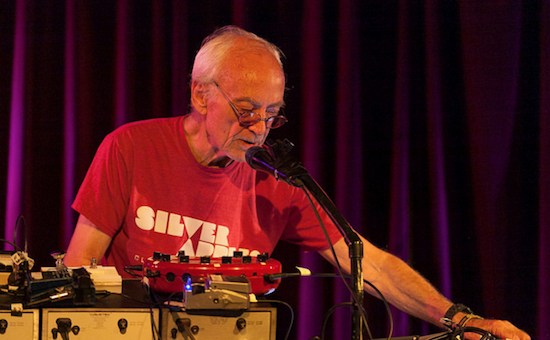Now the dust had settled on another instalment of Incubate, Tilburg’s yearly exploration of practically every form of music imaginable, it might be time to look back and try and work out exactly what its place is in the crowded world of left field music festivals. Where does Incubate, which has been going in one form or another since 2005, with it’s nomadic musical philosophy and commitment to making difficult art fun, sit in comparison with the CTM’s, Atonals and Unsounds, with their heady mixes of electronic music, contemporary art practice and thought through, overarching themes? The simple answer of course is ‘it doesn’t’. Unsound this year has set it’s theme as ‘DISLOCATION’. Atonal’s founder recently described the music showcased at his festival as ‘serious’ and ‘existential’. Incubate’s closing night party featured a large bearded man dancing around a miniature cardboard Stonehenge. Parallels are not immediately obvious. But Incubate’s eccentric and wide-ranging approach to the the acts it books is, in its own way, just as radical an exercise in free thought as any more high-minded approach. By forcing punters to join the dots on all this musical activity themselves, Incubate encourages a pluralistic approach to musical enjoyment that sets the dynamics of separate bands against each other and forces weird commonalities and tangents to rise out of the weekend.
The band who might be expected to stand out the most this year are therefore and interesting place to start. Trio Qasyon Are a Syrian traditional three piece (winnowed down to a two-piece of sisters Jawa and and Shaza Manla for this show) who play traditional Syrian folk music. The two instruments on stage are Jawa’s Oud and Shaza’s Qanun (a lap-balanced zither-style instrument) and in the hands of these to young women (and I use the term advisedly, Shawa is 12 years old) they set up a dialogue that’s as affectingly dizzying and moving as anything heard over the whole weekend. Jawa’s playing can be legitimately described as shredding. She mercilessly hammers away at her instrument’s wooden fretboard, locking into and drifting away from her sister’s nimbly struck flocks of shivering glissando. The effect is head spinning: the floor suddenly dropping out of the music before a sudden darting run from one of the sisters tugs the structure taut again, and the playing is both playful and ferocious. And then Jawa opens her mouth to sing and the saddest sound in the world comes out. Throughout the performance Jawa has been addressing the audience in excellent Dutch – especially excellent when you consider that she and her sister have only been living in Holland for 12 months – not a language I have any inkling of how to understand. However when Jawa says ‘Aleppo’ the word stands out like a distress flare. Jawa and her sister are former residents of the city, two of the lucky ones who managed to get out, and when she starts singing – her voice much deeper than expected – the room calcifies. The sudden silence when she begins is one of the things I will always treasure about this year’s Incubate. The sheer attention suddenly granted; no one shuffling, or sniffling or doing anything but watching, just totally held rapt by a sheer expression of numb pain and desperate sadness hardened and beaten into song.
A day later I see a performance from Anemone Tube, AKA Berlin’s Stefan Hanser, in the same venue. The atmosphere couldn’t be more different. Lights dimmed to accentuate the burning incense set up in front of his table of ominous looking banks of lights and switches, head wrapped entirely in muslin like a classic serial art pervert, Hanser stands before his petrifying collision of cochlea harvesting electronics, scraped metal and disembodied voices like a monk cleaning an altar. Someone awed into servitude by their own creation. It’s beautiful and rich and involving; volume being utilised to still a restless mind into meditation and contemplation. When Hanser sings – back arched, head thrust toward the ceiling, left hand locked into a twitching fist – the sound that emerges is less the aggressive bark of the more traditional power electronics style of vocalist and more the sound of a life lost in a wind tunnel, an inevitable pointless echo. Maybe I’m reading too much into it – and maybe I’ve been influenced by the small statue of the Buddha that sits at the front of his set up – but the snowblinding scree that Anemone Tube traffics doesn’t feel at all like aggression or provocation, it’s more like a kind of violent sudden acceptance. Another voice in the tunnel. It’s a sad and vicious and comforting noise and it takes a long time to shake it off.
And then a day later than that, tired now and hungover and sloshing with the Trappist ale that Tilburg so famously uses to benumb the unwary, I find myself face to face with Simeon from the Silver Apples for the first time and it all clicks together. Even in the absence of original drummer Danny Taylor – a loss you might have imagined as being critical, seeing as Silver Apples were famously an extremely hermetic two-piece at their height – the music from their small discography sounds potently strange. The absence of Taylor is rendered even more remarkable in the face of the music’s perfectly odd, machine generated rhythmic thrust, all drags and rolls where the beats should be and clacks where there ought to be clangs, and Simeon’s presence is starkly fascinating. Artificeless, blinking in the light of his strange machines and sending whorls and eddies of sound bouncing around the walls with all the relaxed attention of an ancient Egyptian chemist. His voice, always familiarly folksome but imbued with just the right amount of psyched-out panic to give it steel, is naturally an even more fragile instrument these days, but there’s a delicate longing to it that hits just right, and the genuine awe with which Simeon still imbues ‘Oscillations’ is a heavy thing to be stood in front of. Possibly the single song most alive to the psychedelic mysteries, being sung by someone who probably spends longer than a lot of Quietus readers do thinking about oblivion: Simeon was born in 1938. This fragility gives a familiar song a sudden, previously unimagined power, not to mention giving its sense of yearning a fatalistic new dimension.

Three instances of a human voice crying out for something it doesn’t have. One in a language I can’t understand, one singing a song I’ve loved for over a decade and another in no language at all. It could be I’m reductively – maybe even offensively – conflating three voices which should have nothing to do with each other. How can you compare the musings of New York based psychedelic voyager with a tune sung by someone alive to the horror of losing a home or family members? Should I even be attempting to ascribe meaning to a song that, lets face it, could be about toy car collecting or Syrian pest control? But the questions that this approach ends up raising are not necessarily comfortable ones, and nor should they be. At the very least watching Trio Qasyon having just run down the road from a Mutilation Rites show should give you pause to think about privilege when it comes to depictions of violence and carnage in art. But its these loose connections and strange coincidences that make Incubate a thought provoking festival. The simple comparison of three different voices raising a myriad of questions about identity, privilege, cultural appropriation, the role of language and desire. It could be that despite its lack of overarching themes and high art aspiration, and despite the presence of the bloke in the beard dancing around a tiny Stonehenge, Incubate is the smartest weekend away of the lot.


